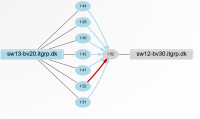Description
shows the same neighbor on many neighbor ethernet ports
debug output
+----------+--------+---------------------------------+------+----------------------+---------+
|
| Protocol | ifName | Remote: hostname | port | platform | version |
|
+----------+--------+---------------------------------+------+----------------------+---------+
|
| LLDP | 1:25 | bv-itgrp-sw.itgrp.dk | 1:52 | ExtremeXOS (X460G... | ... |
|
| LLDP | 1:30 | BV20-itgruppen (172.16.200.190) | 1:52 | ExtremeXOS (X460G... | ... |
|
| LLDP | 1:41 | kb-bv18.bjerg.info (10.0.0.33) | 1:52 | ExtremeXOS (X460G... | ... |
|
| LLDP | 1:42 | GS1920 (192.168.1.100) | 1:52 | ExtremeXOS (X460G... | ... |
|
| LLDP | 1:44 | bv-esxi-sw.itgrp.dk | 1:52 | ExtremeXOS (X460G... | ... |
|
| LLDP | 1:51 | sw14-bv12.itgrp.dk | 1:52 | ExtremeXOS (X460G... | ... |
|
| LLDP | 1:52 | sw12-bv30.itgrp.dk | 1:52 | ExtremeXOS (X460G... | ... |
|
+----------+--------+---------------------------------+------+----------------------+---------+
|
|
|
|
|
|
^[[1;44;96m > $valid[$module]^[[0m^[[44;36m /opt/observium/includes/discovery/neighbours.inc.php:61 ^[[0m
|
array(
|
[2894] => array(
|
[bv-itgrp-sw.itgrp.dk] => array(
|
[1:48] => int(1)
|
)
|
)
|
[2899] => array(
|
[BV20-itgruppen-172.16.200.190] => array(
|
[74 AC B9 29 E9 83 ] => int(1)
|
)
|
)
|
[2910] => array(
|
[kb-bv18.bjerg.info-10.0.0.33] => array(
|
[Gi1/0/48] => int(1)
|
)
|
)
|
[2911] => array(
|
[GS1920-192.168.1.100] => array(
|
[25] => int(1)
|
)
|
)
|
[2913] => array(
|
[bv-esxi-sw.itgrp.dk] => array(
|
[1:48] => int(1)
|
)
|
)
|
[2920] => array(
|
[sw14-bv12.itgrp.dk] => array(
|
[1:52] => int(1)
|
)
|
)
|
[2921] => array(
|
[sw12-bv30.itgrp.dk] => array(
|
[1:52] => int(1)
|
)
|
)
|
)
|

